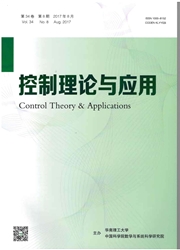

 中文摘要:
中文摘要:
本文提出了一种新颖的主动队列管理(active queue management,AQM)策略一间隔随机早期检测(interval randomearly detection,IRED).与传统的RED机制不同,IRED的参数设计中,平均队长的门限值一最小阀值和最大阈值从固定不变的单值,变为了一个阈值区间.相对于RED的单值固定阈值的设计,IRED的适应能力和鲁棒性得到增强,在大多数的网络环境下能够保持良好的性能,特别是在网络状态出现波动和突变时,其性能比传统的AQM算法更佳.本文进一步采用了TCP-AQM的动态模型分析了使用IRED控制器的拥塞控制系统的稳定性,分析了系统的稳定裕度,并给出了稳定裕度与控制增益的关系式,从而提出了一种根据期望稳定裕度来设计阈值区间的系统化方法.最后,在NS一2仿真平台上,通过与RED和Gentle—RED两种算法比较,证明了IRED的优越性,特别是在变负载的网络环境下的良好性能.
 英文摘要:
英文摘要:
A novel active queue management(AQM) scheme called IRED(interval random early detection) is proposed to avoid the network congestion. Being different from the RED (random early detection) algorithm, the IRED uses the interval parameter mechanism to reduce the control sensitivity to the network variation, which improves the adaptive and robust performance of the network system. With the interval design, IRED achieves a better performance in the busty network environment. Furthermore, the closed-loop stability of the congestion control system is studied based on the trans- mission control protocol-active queue management(TCP-AQM) dynamic fluid model. By analyzing the stability margin of the congestion control system, we propose a systematic design method to design the interval parameter according to the expected stability performance. Finally, the simulation experiment is studied to verify the superior performance of IRED in a varying network environment.
 同期刊论文项目
同期刊论文项目
 同项目期刊论文
同项目期刊论文
 H-infinity control for networked control systems with data packet dropouts and partly unknown transi
H-infinity control for networked control systems with data packet dropouts and partly unknown transi Mean square consensus control for second-order multi-agent systems under fixed topologies and measur
Mean square consensus control for second-order multi-agent systems under fixed topologies and measur Building-Environment Control With Wireless Sensor and Actuator Networks: Centralized Versus Distribu
Building-Environment Control With Wireless Sensor and Actuator Networks: Centralized Versus Distribu Empty glass bottle inspection method based on fuzzy support vector machine neural network and machin
Empty glass bottle inspection method based on fuzzy support vector machine neural network and machin Stabilizing switching design for switched linear systems: A state-feedback path-wise switching appro
Stabilizing switching design for switched linear systems: A state-feedback path-wise switching appro Scheduling strategy for logarithmic quantization under bandwidth constraints based on controller are
Scheduling strategy for logarithmic quantization under bandwidth constraints based on controller are Dual decomposition method for optimal and fair congestion control in Ad Hoc networks: Algorithm, imp
Dual decomposition method for optimal and fair congestion control in Ad Hoc networks: Algorithm, imp A Three-domain Fuzzy Wavelet System for Simultaneous Processing of Time-Frequency Information and Fu
A Three-domain Fuzzy Wavelet System for Simultaneous Processing of Time-Frequency Information and Fu Support Vector Machine Based Optimal Control for Minimizing Energy Consumption of Biped Walking Moti
Support Vector Machine Based Optimal Control for Minimizing Energy Consumption of Biped Walking Moti 期刊信息
期刊信息
